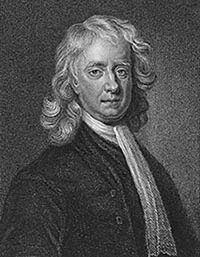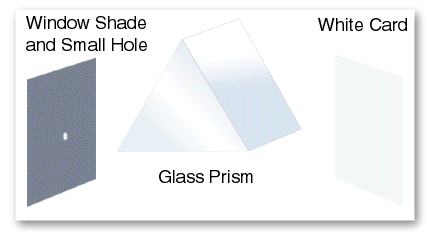I Thought Newton Only Discovered Gravity

Yes, Sir Isaac Newton is best known for his work on gravity, but he worked on and discovered many other scientific wonders during his lifetime (1642-1727). He was also the first scientist to be knighted, which is a great honor in England and the reason "Sir" precedes his name.
What Else Did Sir Isaac Newton Discover?
Besides his work on universal gravitation (gravity), Newton developed the three laws of motion which form the basic principles of modern physics. His discovery of calculus led the way to more powerful methods of solving mathematical problems. His work in optics included the study of white light and the discovery of the color spectrum. It was his experiments with light that first made him famous.
How Did Newton Discover the Color Spectrum?
Newton performed an experiment using a glass prism. For the experiment he placed a glass prism in front of a beam of light projected through a tiny hole in a window shade. You can perform a virtual version of the experiment below. You just need to place the mouse cursor over the prism to darken the room and reveal the color spectrum.

Read more about: Seeing Color
Bibliographic details:
- Article: Sir Isaac Newton
- Author(s): Dr. Biology
- Publisher: Arizona State University School of Life Sciences Ask A Biologist
- Site name: ASU - Ask A Biologist
- Date published: 17 Dec, 2009
- Date accessed: 18 May, 2025
- Link: https://askabiologist.asu.edu/sir-isaac-newton
APA Style
Dr. Biology. (Thu, 12/17/2009 - 10:24). Sir Isaac Newton. ASU - Ask A Biologist. Retrieved from https://askabiologist.asu.edu/sir-isaac-newton
Chicago Manual of Style
Dr. Biology. "Sir Isaac Newton". ASU - Ask A Biologist. 17 Dec 2009. https://askabiologist.asu.edu/sir-isaac-newton
MLA 2017 Style
Dr. Biology. "Sir Isaac Newton". ASU - Ask A Biologist. 17 Dec 2009. ASU - Ask A Biologist, Web. https://askabiologist.asu.edu/sir-isaac-newton

Painting of Newton's Discovery of the Refraction of Light by Pelagio Palagi (1827).
Be Part of
Ask A Biologist
By volunteering, or simply sending us feedback on the site. Scientists, teachers, writers, illustrators, and translators are all important to the program. If you are interested in helping with the website we have a Volunteers page to get the process started.



